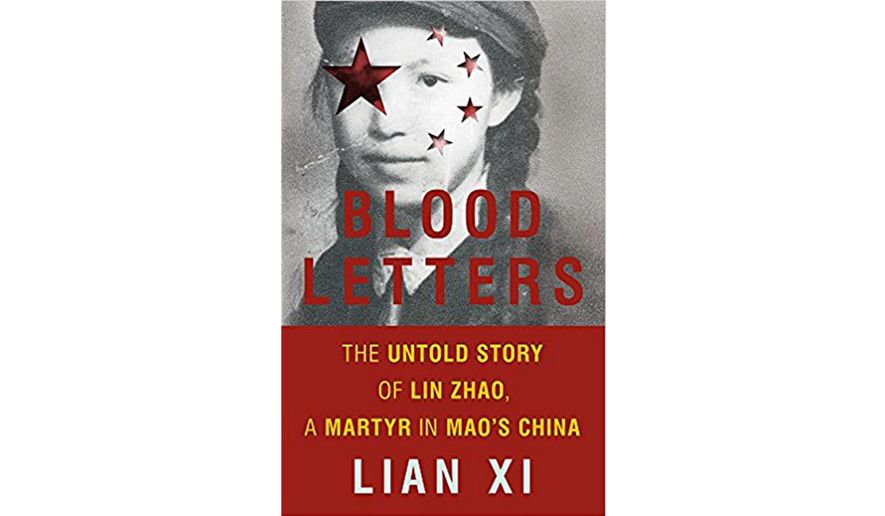OPINION:
BLOOD LETTERS: THE UNTOLD STORY OF LIN ZHAO, A MARTYR IN MAO’S CHINA
By Lian Xi
Basic Books, $30, 352 pages
As “free speech” and Vietnam War protests roiled the nation decades ago, a noisy fringe among the marchers proudly flaunted the green cotton jacket preferred by Mao Zedong, longtime dictator of the People’s Republic of China.
Many political know-nothings waved copies of “Quotations from Chairman Mao,” known in the West as “The Little Red Book,” which extolled the mutant form of communism Mao dictated for China.
As leftists exhorted the grandeurs of Mao-thought, thousands of miles distant, an unbelievably brave young woman clung to life in one of Chairman Mao’s prisons, denied any of the freedoms enjoyed by American protesters.
She was Lin Zhao, praised by the Nobel Peace laureate Liu Xiaobo as “the only voice of freedom left for contemporary China.” Lacking pen and ink, she “spoke” to the outside world by cutting into her own veins and using her blood to scrawl anti-Mao manifestos and poems.
Her story is grippingly related by Lian Xi, a professor at Duke Divinity School, who obtained Lin Zhao’s massive court file, including her “blood writings.”
Born in 1932 into a politically active family, Lin Zhao was a political anomaly in her youth. She attended a girls’ school run under auspices of Methodist Episcopal missionaries, and then studied journalism at a communist college. Paradoxically, she was attracted both to Christianity and to the Chinese Communist Party (CCP) which she joined at age 16.
She was an early devotee of Mao, who promised democracy and prosperity when he assumed power in 1950.
Disillusion came quickly. Mao demanded strict obedience to his concept of communism, including “moral purification” and self-criticism in which CCP members were forced “to constantly examine the mistakes and shortcomings in one’s own work.” Purges weeded millions of “undesirables” from the CCP; an uncountable number were executed.
Mao mobilized rural support with the slogan, “Down with the intellectual class!” He smiled approvingly as urban gangs smashed homes and businesses belonging to “local tyrants.”
Lin Zhao’s faith in communism faded as she saw peasants forced to surrender their meager grain crops.
Between 1 million and 2 million persons died in the country, from starvation and CCP thugs. “Starvation led people to cannibalize dead bodies,” Lian Xi writes.
An even deadlier campaign was Mao’s “Hundred Flowers Movement,” designed to invite criticisms of, and help improve, the party’s work. In due course the campaign morphed into an era that rivaled the death toll of Stalin’s purges.
Lin Zhao’s distress over the murderous campaign led to a weakness for wine, and several romances ended sadly. A party leader shamed her publicly, and she was ejected from the party.
She and friends responded by publishing an underground periodical, “A Spark of Fire,” which derided the “slavery” of Mao’s rule.
She contended that the cult of idolatry around Mao had created the “fascist rule of a centralized state” more in common with the Nazis than socialism. His movement was renamed the “Great Leap Backward.”
These and other biting criticisms put Lin Zhao into prison with a 20-year sentence. But harsh treatment and severe tuberculosis did not silence her protests. And she put her writing skills to work protests to possible supporters, including the United Nations.
One sympathetic recipient was Ke Quingshi, the Shanghai mayor who was also repelled by Mao’s terror. After protesting, he met a mysterious death that friends considered to be a murder.
The outraged Lin Zhao began a frenzy of writing; since Ke had shed his blood for her, she would repay him in kind. Denied writing materials, she began drawing blood from her arms at night with a variety of pricks: A bamboo sliver, a hair clip, a sharpened plastic spoon.
She used a plastic spoon to hold her blood as she wrote. If the blood dried, she added water to bring it back to “ink.”
Her tribute to Ke was a play that she wrote over some 300 days, containing 230,000 scrawled Chinese characters.
Knowing that jailers seized much of what she wrote, including letters to her mother, she kept copies which she secreted in her cell. Her religious faith never faltered. “As a Christian,” she wrote, “my life belongs to my God. “
Her words seemed designed to infuriate Mao. “The Cultural Revolution is not a mass movement; it is one man working on the masses with the barrel of a gun.”
Her fate was inevitable: death by a firing squad. But thanks to scholar Lian Xi, her words survive.
As Chinese rulers grant life tenure to current president Xi Jinping, a brave woman’s “blood letters” should provoke second thoughts.
• Joseph C. Goulden is the author of 19 non-fiction books.




Please read our comment policy before commenting.